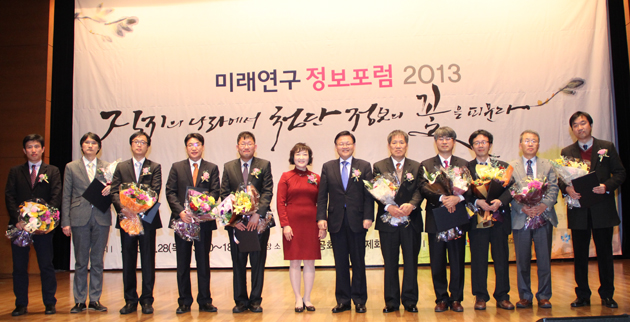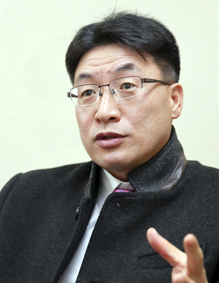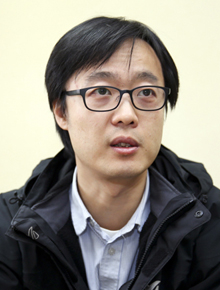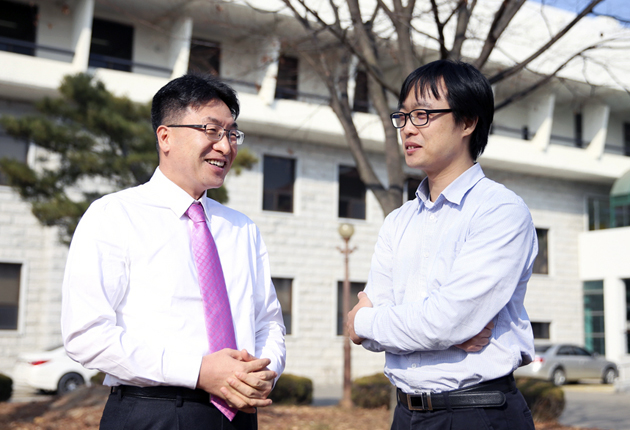Professor Park, Ju Hyun and Jung, Jae Eun each Won 'Knowledge Creation Award' from Ministry of Science, ICT and Future Planning N
No.88630- Writer YU
- Date : 2014.01.03 09:40
- Views : 10464
2 of 10 winners from YU Professors
Professor Park, Ju Hyun of the Department of Electrical Engineering published over 230 SCI theses since 2000
Professor Jung, Jae Eun of the Department of Computer Engineering became the youngest winner at 37 years old
Overcoming the limitations of being a regional university and received global recognition
[Dec 4, 2013]
Professor Park, Ju Hyun of the Department of Electrical Engineering published over 230 SCI theses since 2000
Professor Jung, Jae Eun of the Department of Computer Engineering became the youngest winner at 37 years old
Overcoming the limitations of being a regional university and received global recognition
[Dec 4, 2013]

Ministry of Science, ICT and Future Planning gave the '2013 Knowledge Creation Award' to 10 of Korea's top scientists. Two of them were from YU (from third on left, Professor Jung, Jae Eun, Professor Park, Ju Hyun)
The 2 YU professors were awarded at the 'Knowledge Creation Award' given to Korea's top scientists in creating knowledge with high contribution to international academics. Two of the 10 were from YU Professors showing the strength of the university's research capacities.
The winners were Professor Park, Ju Hyun (45) of the Department of Electrical Engineering and Professor Jung, Jae Eun (37) of the Department of Computer Engineering. The two were awarded the '2013 Knowledge Creation Award' at the Future Research Information Forum 2013' hosted by the Korea Chamber of Commerce & Industry and Ministry of Science, ICT and Future Planning (Minister Choi, Mun Kee).
The 'Knowledge Creation Award' that began in 2009 excluded the recommendation method of the past for more fairness and objectivity of evaluations. KISTI (Korea Institute of Science and Technology Information), which in charge of the evaluation, uses papers listed in the global science and technology index database SCIE and SCOPUS to award leading scientists with the highest research productivity and impact for each section among papers in the top 1% annually in terms of number of citations for the past 10 years.
 Professor Park, Ju Hyun (photo, right) was recognized for his contributions to the development of the control theories sector that provides support to implement optimal performance through state analysis and interpretation of various systems in which mathematical modeling is possible. In particular, Professor Park brought YU to be ranked as the world's top 40 universities in the '2012 QS World University Rankings' by the academic subject. Thanks to Professor Park, YU became the only Korean university to be ranked in the world's top 50 in mathematics. In 2011, it was ranked higher than Stanford University and was ranked at a similar level with Yale University. Professor Park, who is nicknamed the 'Monster Professor' and 'Master of Theses', is unparalleled in research capacities. After serving as a professor at YU in March 2000, he published over 230 papers in the international SCI journals. When including the theses published in other domestic and international academic journals and presentations at academic conferences, he has over 380 theses. He basically published 29.2 papers every year.
Professor Park, Ju Hyun (photo, right) was recognized for his contributions to the development of the control theories sector that provides support to implement optimal performance through state analysis and interpretation of various systems in which mathematical modeling is possible. In particular, Professor Park brought YU to be ranked as the world's top 40 universities in the '2012 QS World University Rankings' by the academic subject. Thanks to Professor Park, YU became the only Korean university to be ranked in the world's top 50 in mathematics. In 2011, it was ranked higher than Stanford University and was ranked at a similar level with Yale University. Professor Park, who is nicknamed the 'Monster Professor' and 'Master of Theses', is unparalleled in research capacities. After serving as a professor at YU in March 2000, he published over 230 papers in the international SCI journals. When including the theses published in other domestic and international academic journals and presentations at academic conferences, he has over 380 theses. He basically published 29.2 papers every year. His impact on the academic circles is also noteworthy. The number of citations of SCI papers that he published in the past 15 years are 5,300 times in Elsevier's Scopus, and over 6,500 citations in the Google Scholar Citation. He is currently working as an editorial board member of 4 SCI journals including <Applied Mathematics and Computation>. Professor Park said, "I am planning to expand my research themes in convergence sectors including physics and biology."
 Professor Jung, Jae Eun (photo, left) who won the award as the youngest ever at the age of 37 was recognized for his research on the design and development of the Semantic Information Processing Framework for supporting the cooperation among distributed information systems in the Big Data technology sector, which is currently a global issue. In the past 3 years, Professor Jung published over 30 papers in internationally prominent SCI academic journals and his theses were cited over 810 times.
Professor Jung, Jae Eun (photo, left) who won the award as the youngest ever at the age of 37 was recognized for his research on the design and development of the Semantic Information Processing Framework for supporting the cooperation among distributed information systems in the Big Data technology sector, which is currently a global issue. In the past 3 years, Professor Jung published over 30 papers in internationally prominent SCI academic journals and his theses were cited over 810 times. Professor Jung explained, "Based on the results of analyzing lots of information exchanged online, it is possible to improve the quality of life by extracting and utilizing useful information. Furthermore, it can be used in various sectors such as improving corporate productivity, management innovation, cutting social costs in the public sector, and improving the quality of public services."
Professor Jung, who said that he was interested in the 'Internet of Things' field that is one of the next-generation growth engine fostering programs, stated, "If the internet in the past was for the connection of web pages, 'Internet of Things' will increase additional value by sharing data generated by the objects surrounding us and generating various derived information," while adding, "I am thinking about what kinds of services will be possible when such environment is established."
